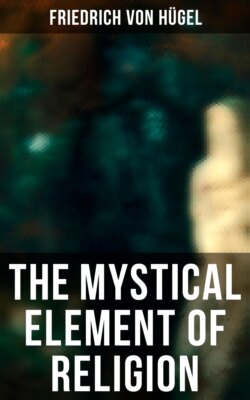Читать книгу The Mystical Element of Religion - Friedrich von Hügel - Страница 92
На сайте Литреса книга снята с продажи.
2. Her practice as regards the Holy Eucharist, throughout her Convert Life.
ОглавлениеSince Holy Communion was the great source and centre of her love and strength, and the one partially external experience and practice which was thus renewed day by day throughout her life, and in the spiritual apprehension and effect of which we cannot trace any distinct periods, I shall dwell here, once for all, upon the characteristics of this devotion of hers, which were at all special to herself.
For one thing, even her ardent love of Holy Communion did not suppress a bashful dislike of being noticed or distinguished in the matter: “At the beginning of her conversion she had at times a feeling as of envy towards Priests, because they communicated on as many days as they would, without any one wondering at it.” “Once when, for a few days, the city was under an interdict, she went every morning a mile’s distance outside of the city walls, so as to communicate; and she thought that she would not be seen by any one.”[59]
Next, there is a most characteristic eagerness for interiorization, for turning the Holy Eucharist, perceived without, into the heart’s food within; and a corresponding intensity of consciousness and tenderness at the moment of reception. “When she saw the Sacrament on the altar in the hands of the priests, she would say within herself: ‘Now swiftly, swiftly convey it to the heart, since it is the heart’s true food.’” And “one night she dreamt that she would be unable to communicate during the coming day, and waking up, she found that tears were dropping from her eyes, at which she wondered, since hers was a nature very slow to weep.” And “when at Mass, she was often so occupied with her Lord interiorly, as not to hear one word of it; but when the time for Communion arrived, at that instant she would become conscious of exterior things.” And she would say: “O Lord, it seems to me, that if I were dead, I should return to life to receive Thee; and that if an unconsecrated host were given to me, I should recognize it to be such by the mere taste alone, as one discerns water from wine.”[60]
Again, her Communion practice bears upon it the stamp of a staunch virility; of a constant emulation between her own generous turning-away from its sensible consolations and the divine action, which seems to have maintained these consolations throughout her life; and of a determination to abstain even from such deeply consoling Communions, if such abstention were the more perfect practice for her. “One day, when she had communicated, there came to her so much odour and so much sweetness, that she felt as though in Paradise. But turning at once towards her Love she said: ‘O Love, wouldest thou perchance draw me to Thee with these savours (sapori)? I desire them not, since I desire but Thee, and Thee whole and entire!’” And “one day a holy Friar,”—it was probably the Observant Franciscan, Father Angelo of Chiavasso (near Genoa), beatified later on,—“said to her: ‘You communicate every day: what kind of satisfaction do you derive from it?’ And she answered him simply, explaining to him all her desires and feelings. But he, to test the purity of her intention, said: ‘There might possibly be some imperfection in such very frequent Communion,’ and then left her. And Catherine having heard this, fearing such imperfection, at once suspended her Communions, but at the cost of great distress. And the Friar, hearing a few days later of how she cared more not to do wrong than to have all the consolation and satisfaction of Communion, sent her word by all means to return to her daily Communions; and she did so.”[61]
And finally, her Communions produced effects direct and indirect, spiritual and psychical. The indirect, psycho-physical effects being variable, and related to the varying conditions of her health, will be noted as far as possible under the different periods of her life and, collectively, in the chapter on such psycho-physical questions. The spiritual effects no doubt grew, but this growth we have no sufficient materials for pursuing in detail. Yet they have throughout this peculiarity, that, central and all-permeating as this Eucharistic influence no doubt was, yet it nowhere takes the form of any specially Eucharistic devotion or directly Eucharistic meditation or doctrine, outside of Holy Communion itself and of the immediate occupation with it. Some deep indirect effects on her general tone, imagery, and teaching will be studied in our second volume.
